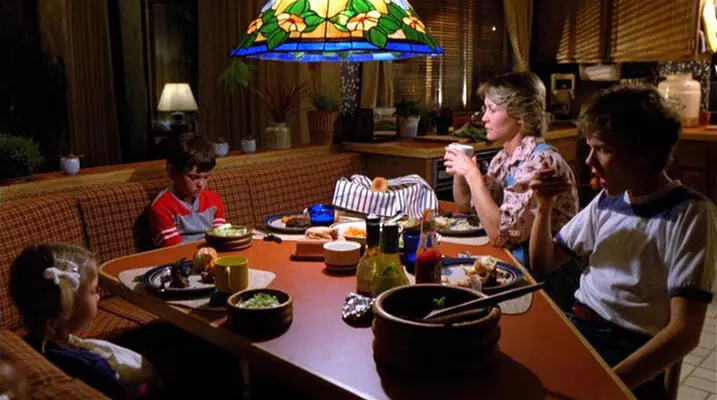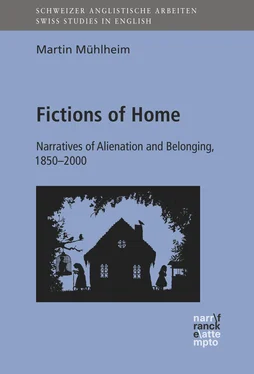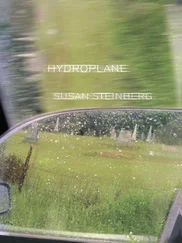Growing Up: Redefining the Meaning of Home
Returning to the discussion of SpielbergSpielberg, Steven’s E.T. and its second important intertext, Peter Pan , we must first note that, in J.M. BarrieBarrie, J.M.’s story, the process of growing up is conceived as a dialecticdialectic of exileexile and homecoming.18 Early on in the story, Peter Pan – “the boy who wouldn’t grow up,” according to the subtitle of the original stage version (179) – leads Wendy and her two little brothers away from the family home, taking them with him to Neverland. There, Wendy and her brothers have all kinds of dangerous adventures, but ultimately they return to the family home where, in time, they grow up and become adults. Years later, when Wendy tells her daughter Jenny about her adventures in Neverland, the girl wonders why Wendy is no longer able to fly, which apparently she had been capable of as a child. Wendy, however, knows exactly why adults, unlike childrenchildren, remain earthbound: “they are no longer gay and innocent and heartless” (174; ch. 17). And it is true that Peter appears heartless throughout BarrieBarrie, J.M.’s story; we learn, for instance, that with regard to heroic deeds, “it was his cleverness that interested him and not the saving of human life” (82; ch. 4). Indeed, as Annie Hiebert AltonAlton rightly notes, Peter’s heartlessness is that of a very small child who “seems unaware of the feelings of others” (174n1). Accordingly, as an eternal child Peter is free from the ties that bind one to others, and can simply do whatever he pleases.19 This freedomfreedom, however, comes at the cost of familial belonging, for as we learn at the end of a chapter entitled “The Return Home” – in which Wendy and her brothers are reunited with their parents – Peter “had ecstasies innumerable that other children can never know, but he was looking through the window at the one joy from which he must be for ever barred” (169; ch. 16). In Peter Pan , in short, there is an irreconcilable conflictconflict between, on the one hand, freedom from interference with one’s desires, and, on the other, the freedom to belong and be part of a family home – with everyone except Peter eventually opting for the latter.20
The idea that as childrenchildren we enjoy a greater degree of freedomfreedom than is the case later in life may, of course, be merely an instance of nostalgicnostalgia idealizationidealization – and nostalgianostalgia is in fact a crucial concept in any discussion of home because it can be understood, like traumatrauma and shell shock, as one particular symptom of alienationalienation and unbelonging. According to Kimberley K. SmithSmith, Kimberley K., the term nostalgia was coined in 1688 by the physician Johann Hofer, who used it to describe a severe, even potentially fatal illnessillness diagnosed among Swiss mercenaries, and in Hofer’s view caused by the mercenaries’ physical absenceabsence from home (509). In the course of the eighteenth and nineteenth centuries, SmithSmith, Kimberley K. continues, the concept’s meaning broadened and complicated: “Once defined simply as a desiredesire to return home, to a specific place , nostalgia was gradually being conceptualized as a longing to return to a former time – and usually a time the patient only imagined to be better” (512; original emphasis). SmithSmith, Kimberley K.’s main point, however, is that we should not simply dismiss the longing for the past as “mere nostalgia,” but instead regard nostalgicnostalgia desires “as a valuable basis for social critique” (523). While we may all agree that it is impossible to simply return to a past state, nostalgicnostalgia subjects may nevertheless have perfectly valid reasons for rejecting the current state of affairs. More generally, nostalgia is an expression of individual or collective values and desires that, as such, may very well be legitimate.21 If Elliott, for instance, longs for the time before his father left the family home, then a certain degree of nostalgicnostalgia idealization may well be involved, but this does not invalidate the boy’s desire to be reunited with a person he loves. At the same time, Roberta RubensteinRubenstein, Roberta suggests that “nostalgia, or homesicknesshomesickness […] is the existentialexistential & existential angst/trauma condition of adulthood” because the process of growing up turns as all into “exiles from childhoodchildhood” (4–5) – an idea symbolized in Peter Pan through adults’ exileexile from Neverland.
At any rate, the implications of growing up as depicted in Peter Pan match precisely some key concerns of E. T. , as the latter, too, tells the story of a child who must learn to respect the feelings of others as part of the process of coming of agecoming of age. The importance of a respect for the feelings of others is made clear early on in SpielbergSpielberg, Steven’s film when Elliott, after his first brief encounter with E.T., fails to convince his mother (as well as his brother and sister) that he has really stumbled upon something unusual in the field behind the family’s suburbansuburbia home:
MARY
[M]aybe you just probably imagined that it happened.
ELLIOTT
I couldn’t have imagined it! […] Dad would believe me.
MARY
Maybe you ought to call your father and tell him about it.
ELLIOTT
I can’t. He’s in MexicoMexico with Sally. (MathisonMathison, Melissa 63)
Elliott’s mother is evidently shaken by her son’s heartless reference to the father’s new lover, and eventually leaves the kitchen in tears. Michael, Elliott’s older brother, is furious: “Damn it! Why don’t you… grow up? Think of how other people feel for a change!” (MathisonMathison, Melissa 64). Michael thus explicitly defines Elliott’s task as the need to be more empathetic, and it is thus significant that Mary will later read the story of Peter Pan not to him, but to his little sister, Gertie, who is still young enough to be “gay and innocent and heartless,” whereas Elliott has already left behind the stage of infantile narcissismnarcissism and begun his journey toward adulthood. Indeed, the film’s mise-en-scènemise-en-scène during the sequence discussed above emphasizes Elliott’s transitional state, as Elliott is shown sitting on one side of a rather oddly-shaped, triangular kitchen table, with Gertie placed on her own on another, and both Mary and Michael positioned at the third (FIGURE 4). Elliott is thus situated symbolically between a very small child and two more adult figures, while at the same time the framing of the shot makes him appear as still closer to his younger sister. The remainder of SpielbergSpielberg, Steven’s film then tells the story of how Elliott is saved from the error of his former, childish ways by his encounter with E.T. the MessiahMessiah figure. Accordingly, when at the end of the film E.T. is ready to go back home, it is no longer Elliott, but Gertie who is in need of spiritual guidance from the alien, whose message to her is as simple as it is clear: “Be good” (MathisonMathison, Melissa 146).
 FIGURE 4:
FIGURE 4:
Elliott is placed symbolically between a small child and two more adult figures. (Screenshot from E.T. ; © by Amblin/ Universal Studios, used by permission.)
And yet, above and beyond these rather homelyhomely pieties, the film’s juxtaposition of Peter Pan with elements from the story of JesusJesus Christ ChristJesus Christ also has some rather more unsettling effects, which becomes apparent if we examine closely the scene in E.T. in which the two intertextualintertextuality references are most explicitly intertwined. The scene in question occurs roughly in the middle of the film and shows Elliott and E.T. hiding in the closet of Gertie’s bedroom while Mary is reading to Gertie from Peter Pan . The passage Mary reads to Gertie tells the story of how Peter tries to save the fairy Tinker Bell by breaking the frame of the fictional world and appealing to the childrenchildren in the audience:
Читать дальше

 FIGURE 4:
FIGURE 4:










